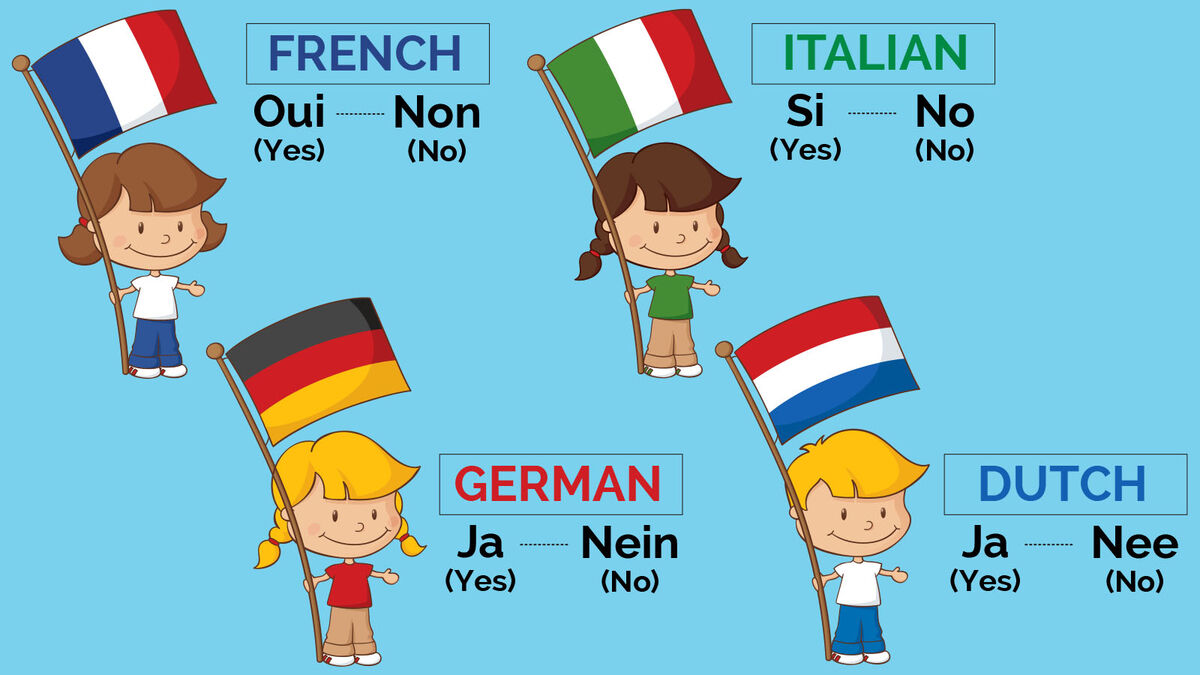
Learning to say “yes” and “no” in every language can be a fun challenge. It might also come in handy if you need to communicate in simple, important terms with someone who speaks a different language. Get started on your basic language learning journey by discovering how to say “yes” and “no” in 46 different languages.
How to Say Yes in 23 Different Languages
These are the standard ways to say “yes” in the most spoken languages in the world. Keep in mind regional and dialect differences may impact how you pronounce the word. The pronunciations are English phonetics.
- Afrikaans: Ja (ya - “a” as in “yacht”)
- Arabic: نعم or na’am (na-am, “a” as in “yacht”)
- Bengali: হ্যাঁ or hä (ha - “a” as in “hat”)
- Dutch: Ja (ya - “a” as in “yacht”)
- French: Oui (wee)
- German: Ja (ya - “a” as in “yacht”)
- Greek (modern): Nai (nay)
- Hausa: Eh (ay)
- Hindi: हाँ or haan (hon)
- Italian: Si (see)
- Japanese: はい or Hai (hi)
- Malay: Ya (ya-a - “a” as in “yacht”)
- Mandarin Chinese: 是的 or shì de (shih-da - “a” as in “yacht”)
- Nepali: हो/ or ho (ho - “o” as in “go”)
- Polish: Tak (tak - “a” as in “yacht”)
- Portuguese: Sim (seem)
- Punjabi: ਆਹੋ or aaho (ah-hoh - “a” as in “yacht” and “o as in “cold”)
- Romanian: Da (da - “a” as in “yacht”)
- Russian: Да or Da (da - “a” as in “yacht”)
- Quechua: Ari (ah-ree)
- Spanish: Sí (see)
- Swedish: Ja (yaw)
- Telugu: అవును or Avunu (ah-voo-noo)
How to Say No in 23 Different Languages
In many languages “no” is simply said as “no” or a very similar word starting with the letter “n.” Explore how they say “no” in some of the world’s most common languages.
- Afrikaans: Nee (nee-uh)
- Arabic: لا or La (lah - “a” as in “yacht”)
- Bengali: না or Nā (nah - “a” as in “yacht”)
- Dutch: Nee (nay)
- French: Non (noh)
- German: Nein (nine)
- Greek (modern): Όχι or óchi (oh-hee)
- Hausa: A’a (ah-ah - “a” as in “yacht”)
- Hindi: नहीं or Hahin (nah-heen - “a” as in “yacht”)
- Italian: No (noh)
- Japanese: いいえ or iie (ee-eh)
- Malay: Tidak (dee-dah - “a” as in “yacht”)
- Mandarin Chinese: 不是 or bù shì (boo-shih)
- Nepali: होइन or Hoina (hoh-eye-nuh)
- Polish: Nie (nyeh - “e” as in “net”)
- Portuguese: Não (now)
- Punjabi: ਨਹੀ or Nahi (nah-hee - “a” as in “yacht”)
- Romanian: Nu (new)
- Russian: Нет (Nyeht)
- Quechua: Mana (mah-na - “a” as in “yacht”)
- Spanish: No (noh)
- Swedish: Nej (nay)
- Telugu: ఏ or Ē (ay)
Explore the World Through Languages
If you loved learning these basic words in different languages, try your hand at a few others. Start by learning how to say “hello” in 37 different languages and how to say “thank you” in 20 languages. You can even learn to write inspiring global messages when you find out how to say “i love you” in 20 languages.